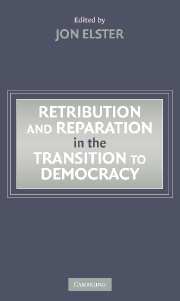Book contents
3 - Retribution
from PART I - GENERAL ISSUES
Published online by Cambridge University Press: 03 December 2009
Summary
INTRODUCTION
After a transition to democracy, leaders, agents, and collaborators of the predemocratic regime are often punished for their actions or omissions under that regime. The punishment can take several forms. First, there is informal social ostracism. It has been estimated, for instance, that during the Liberation of France in 1944–45 about twenty thousand women had their hair cut because they had had intimate relations with Germans (Virgili 2000, pp. 74–78). Second, there are spontaneous killings of collaborators (and looting of their property). The number of extralegal executions after World War II in France and Italy, for instance, was around ten thousand in each country (Woller 1996, p. 279; Rousso 2001, p. 501). Third, there are criminal trials in forms that range from martial courts to ordinary legal proceedings. Fourth, there are purges of professional associations carried out by these organizations themselves. Fifth, there are sanctions imposed on civil servants by the public administration. In this category I also include the various forms of lustration introduced in post-Communist countries. Finally, there is the punishment involved in mere exposure as a wrongdoer. Although it is not clear exactly how the few truth commissions that named perpetrators (Hayner 2001, Ch. 7) harmed these individuals, they would presumably have preferred their deeds to remain outside the public domain. Opening the files of informers to those who were informed upon is another modality of exposure.
- Type
- Chapter
- Information
- Publisher: Cambridge University PressPrint publication year: 2006
References
- 4
- Cited by



